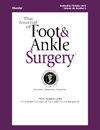Evaluation of the impact of calcitonin nasal spray on bone density: A literature review
IF 1.3
4区 医学
Q2 Medicine
引用次数: 0
Abstract
There is inadequate evidence-based literature for clinicians supporting the role of adjuvant rehabilitation options in cases of bone deficient pathologies, and fractures. A literature search was done from e-resources such as DELNET, J-gate, Scopus, Web of Science, EBSCO & PubMed from 18 May 2000 to 28 August 2024. The search was performed through the student's corner at our university with keywords such as bone density, calcitonin, calcitonin nasal spray, fractures, and pathology. Thirteen studies were included following the inclusion and exclusion criteria. The reviews emphasized that skeletal muscles typically require 18–24 hours to reach peak responsiveness to calcitonin, while patients with high-turnover osteoporotic syndromes often exhibit a quicker bone response even at lower dosages. A weekly dose of 250-2800 IU (International Unit) calcitonin resulted in a substantial increase in bone density. The side effects of calcitonin therapy are mild and short-term: transient nausea and gastric discomfort were reported in 8 to 10 % of the patients, while facial flushing and skin hypersensitivity occurred in 2 to 5 %. The relatively low bioavailability of calcitonin in nasal formulations also limits its utility. Methodological limitations of the reviewed studies include variability in BMD (bone mineral density) assessment methods, potential selection bias, small sample sizes, and lack of blinding in some trials. Calcitonin enhances bone density at weekly dosages of more than 250 IU thereby lowering the risk of fractures. This literature review provides us with an understanding of the potential future applications of calcitonin nasal spray as an adjuvant for enhancing bone mineralization in patients with pathologies and fractures.
降钙素鼻喷雾剂对骨密度影响的评价:文献综述。
临床医生没有足够的循证文献支持辅助康复选择在骨缺乏病理和骨折病例中的作用。检索了2000年5月18日至2024年8月28日DELNET、J-gate、Scopus、Web of Science、EBSCO和PubMed等电子资源的文献。搜索是通过我们大学的学生角进行的,关键词是骨密度、降钙素、降钙素鼻喷雾剂、骨折和病理学。按照纳入和排除标准纳入了13项研究。综述强调骨骼肌通常需要18-24小时才能达到对降钙素的峰值反应,而高周转率骨质疏松综合征患者即使在较低剂量下也经常表现出更快的骨反应。每周服用250-2800国际单位的降钙素可显著增加骨密度。降钙素治疗的副作用是轻微和短期的:8 - 10%的患者报告一过性恶心和胃部不适,而2 - 5%的患者出现面部潮红和皮肤过敏。降钙素在鼻腔制剂中相对较低的生物利用度也限制了它的效用。所回顾的研究的方法学局限性包括BMD(骨密度)评估方法的可变性、潜在的选择偏差、小样本量以及在某些试验中缺乏盲法。每周服用超过250国际单位的降钙素可以增强骨密度,从而降低骨折的风险。这篇文献综述让我们了解降钙素鼻喷雾剂作为一种辅助剂在有病理和骨折患者中增强骨矿化的潜在未来应用。证据等级:V(叙述性文献综述)。
本文章由计算机程序翻译,如有差异,请以英文原文为准。
求助全文
约1分钟内获得全文
求助全文
来源期刊

Journal of Foot & Ankle Surgery
ORTHOPEDICS-SURGERY
CiteScore
2.30
自引率
7.70%
发文量
234
审稿时长
29.8 weeks
期刊介绍:
The Journal of Foot & Ankle Surgery is the leading source for original, clinically-focused articles on the surgical and medical management of the foot and ankle. Each bi-monthly, peer-reviewed issue addresses relevant topics to the profession, such as: adult reconstruction of the forefoot; adult reconstruction of the hindfoot and ankle; diabetes; medicine/rheumatology; pediatrics; research; sports medicine; trauma; and tumors.
 求助内容:
求助内容: 应助结果提醒方式:
应助结果提醒方式:


